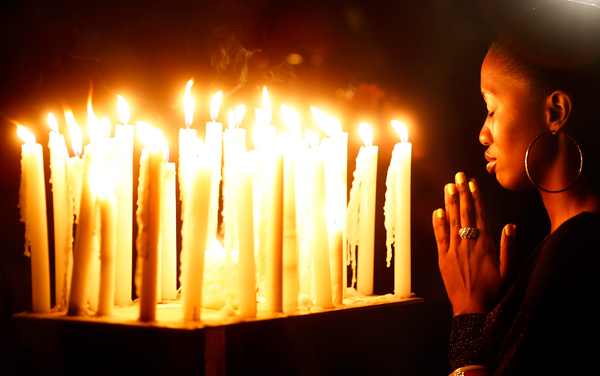Mandela's death 'not affects' S. African political developments
 |
|
A woman folds her hands in prayers next to candles standing outside the house where Nelson Mandela died in Johannesburg, December 7, 2013. [Photo/Agencies] |
JOHANNESBURG -- The death of former president Nelson Mandela "will not pose" an impact on South African future political direction and developments, analysts said on Saturday.
In an interview with Xinhua, University of South Africa (UNISA) Political Sciences Professor, Dirk Kotze said Mandela was not "actively involved" in the ruling African National Congress (ANC) and national politics since his retirement in 1999.
In addition, Mandela had "laid a strong foundation" for the country during his time as president, Kotze said.
Mandela, South Africa's first black president and Nobel Peace Prize laureate, died of a long-standing lung problem on Thursday at the age of 95.
"During the last number of years Mandela played a very limited role both in the party politics and national situations. The political situation has developed without his direct involvement and therefore his absence will not have a major impact on the direction of political developments," Kotze said.
"His presence as an elder statesman was appreciated by all, but it had more of a symbolic value than any direct impact on the direction of events," he added.
Oren Dayan, top local economist and former lecturer at School of Economic and Business Sciences at Wits University, said Mandela is one of African struggle leaders who was "clever enough to prepare" the country's future leaders.
"Mandela knew he could not be the father of the nation forever and groomed other leaders to take over and lead the country. He did this in order to make sure that his vision for South Africa is fulfilled during and outside his life time," Dayan told Xinhua.
Kotze, who was actively involved in South African constitutional transition in the 1990s, said that by the time of Mandela's death, few of his policies were still pursued in their original form.
The constitution drafting expert said Mandela's macro-economic policy of Reconstruction and Development Program (RDP) and later Growth, Employment and Redistribution (GEAR) were superseded by the notion of the "developmental state" and the longer-term National Development Plan.
"His policy of reconciliation and nation-building is not pursued as such but a less focused notion of 'social cohesion' is now at a rhetorical level promoted."



























